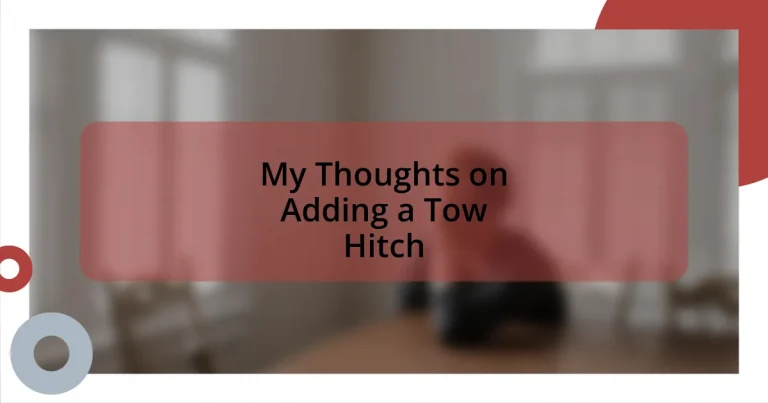Key takeaways:
- Gained confidence and versatility from installing and using a tow hitch, enhancing outdoor adventures.
- Important considerations for installation include vehicle compatibility, towing capacity, and local regulations.
- Different tow hitch types (receiver, fifth wheel, and gooseneck) cater to various towing needs and vehicles.
- Regular maintenance, including inspections and lubrication, is crucial for hitch performance and road safety.
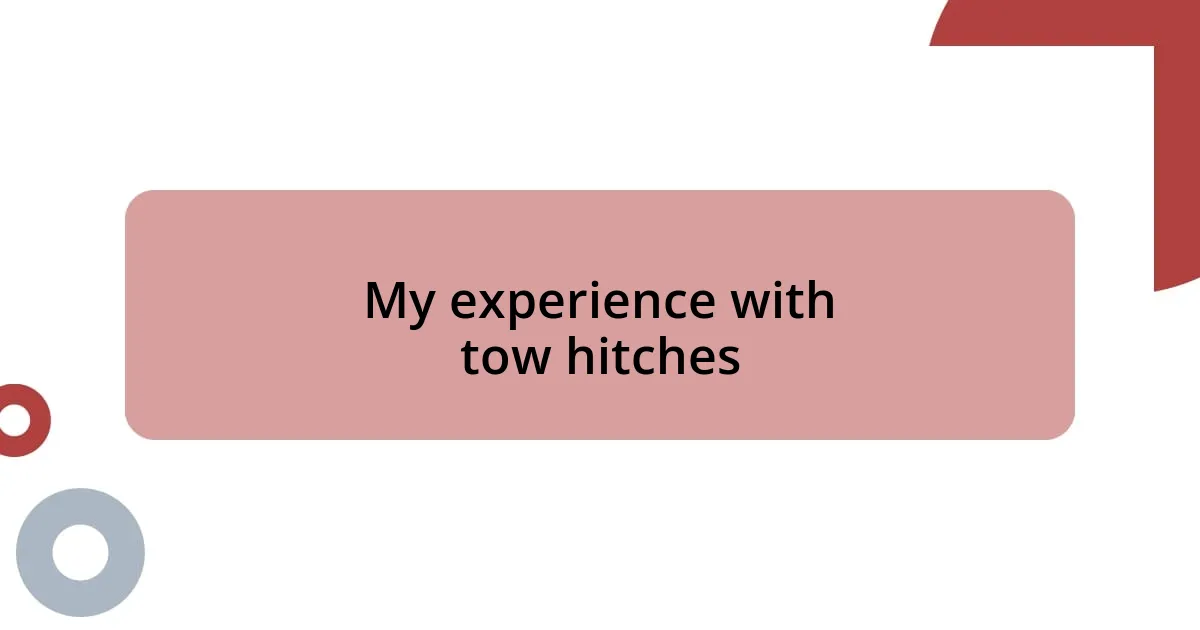
My experience with tow hitches
A few years ago, I decided to install a tow hitch myself. I remember the feeling of excitement mixed with trepidation as I gathered all the tools and followed the instructions. Who knew that a simple piece of equipment could lead to so many adventures, transforming my vehicle into a versatile companion?
I often think back to the first time I towed a small trailer. It was a nerve-wracking experience, but also exhilarating. As I navigated the twists and turns of the road, I realized just how much confidence I gained from mastering that skill. Have you ever faced a challenge that excited you as much as it scared you? That moment of towing felt like a rite of passage.
Since then, I’ve towed everything from camping gear to moving boxes for friends. Each trip has taught me something new about my vehicle’s capabilities and the importance of proper towing techniques. It’s fascinating how a tow hitch can open up new possibilities in life, don’t you think? The emotions connected to each experience—anticipation, joy, even frustration at times—add layers to my appreciation for that sturdy little device.
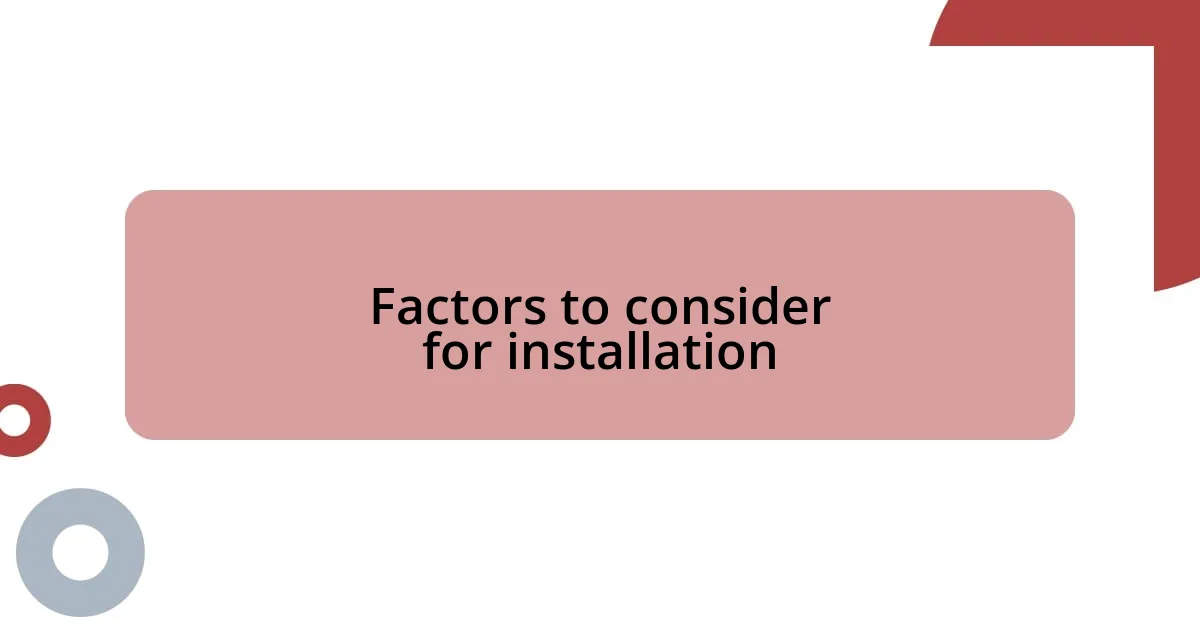
Factors to consider for installation
When considering the installation of a tow hitch, it’s important to evaluate your vehicle’s compatibility. Not all vehicles are designed to handle the same towing capacity, and mismatching can lead to dangerous situations. I recall feeling a bit disheartened when I realized my model had a lower capacity than I anticipated. It’s vital to avoid that letdown—always check your owner’s manual, and don’t hesitate to consult professionals if needed.
Here are some key factors to consider for installation:
- Vehicle model and make: Ensure the hitch is compatible with your specific vehicle.
- Towing capacity: Understand the maximum weight your vehicle can handle safely.
- Hitch type: Choose between receiver hitches, fifth wheel hitches, or gooseneck hitches based on your needs.
- Installation method: Decide if it’s a DIY project or if you’d prefer professional help.
- Local regulations: Be aware of any legal requirements regarding towing in your area.
- Wiring and electrical needs: Consider how electrical connections for brake lights and turn signals will be installed.
I remember once, when I neglected to check my wiring setup before heading out for a weekend trip. It was an eyes-wide-open moment when I discovered that my trailer lights weren’t functioning properly. It stressed me out, and that’s a feeling I never want to repeat. Taking the time to think through these factors can save you from unnecessary headaches down the road.
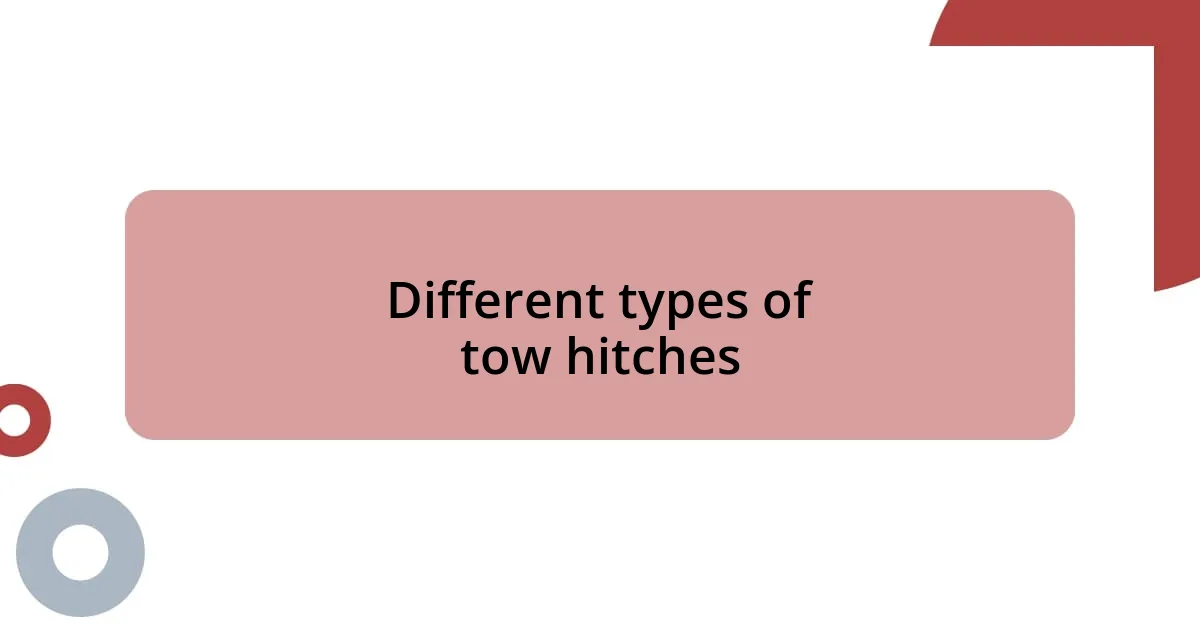
Different types of tow hitches
When it comes to tow hitches, there are several types to consider, each with its unique features and purposes. I’ve come to appreciate the versatility of receiver hitches, as they work well for a range of towing needs—from trailers to bike racks. They usually come in multiple classes that indicate their weight capacity, so you can choose one that fits your specific requirements. I remember the first time I connected my bike rack to a receiver hitch; the ease of attaching it felt like a game changer for my outdoor adventures.
Equally fascinating is the fifth wheel hitch, designed primarily for towing larger trailers, like those used for camping or even hauling a horse. I can still picture the first time I witnessed a friend effortlessly maneuver her fifth wheel into place during a camping trip. It was a symphony of skill and space management, and it made me realize the benefits of having a sturdy setup for heavy-duty towing. This type often requires a specially installed mount in the bed of a truck, which adds stability, making it a popular choice for those who enjoy extended road trips.
Gooseneck hitches are another option frequently discussed, especially in agricultural communities. They’re known for their impressive towing capabilities, offering a tighter turning radius compared to traditional hitches. I recall chatting with a farmer who swore by his gooseneck for hauling equipment; he emphasized how it made tight corners feel like a breeze, even with a hefty trailer in tow. Each type of hitch serves a different purpose, and finding the right one can elevate your towing experience dramatically.
| Type of Tow Hitch | Key Features |
|---|---|
| Receiver Hitch | Versatile, available in various classes, easy to attach, suitable for many trailers and accessories. |
| Fifth Wheel Hitch | Designed for larger trailers, requires a truck bed mount, provides excellent stability and turning radius. |
| Gooseneck Hitch | Ideal for heavy-duty towing, offers tight turning radius, most commonly used in agricultural settings. |
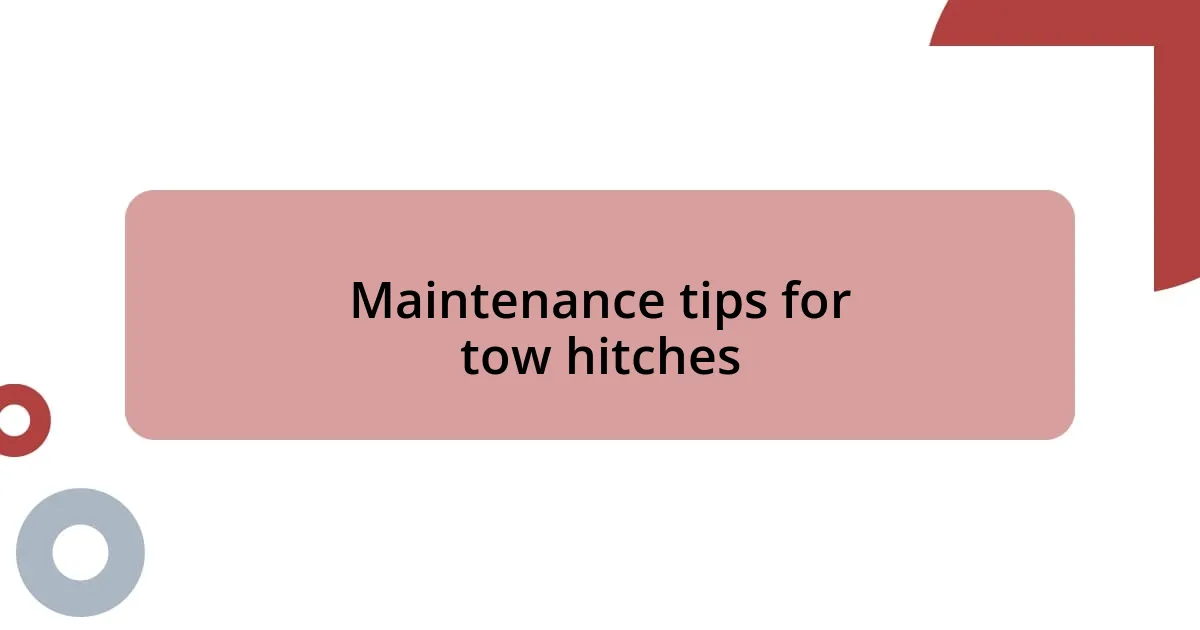
Maintenance tips for tow hitches
Maintaining your tow hitch is crucial for both performance and safety. I can’t stress enough how a quick inspection can save you from potential disasters. Each time I hook up, I take a moment to check for rust or damage; I learned the hard way that neglecting those little things can lead to catastrophic outcomes on the road.
Regularly lubricating the hitch components, especially the ball and socket, can dramatically improve the performance of your setup. I remember a winter trip where I skipped lubricating my hitch, thinking I wouldn’t use it much. The next time I tried to detach it, the hitch was stuck solid. The frustration in that moment was palpable—I had to break out the tools just to get moving. Don’t let that happen to you; keep it clean and well-lubricated.
Additionally, while we often focus on the mechanical aspects, the bolts and accessories should not be overlooked. It’s a good practice to periodically check the torque on your hitch receiver and the integrity of all connections. When I once towed a heavy load without ensuring everything was secure, the rattling sound I heard was unnerving. That day taught me a valuable lesson: don’t skip the small checks, or you might end up with big problems. It’s all about boosting your confidence on the road. Trust me; a little maintenance goes a long way.












